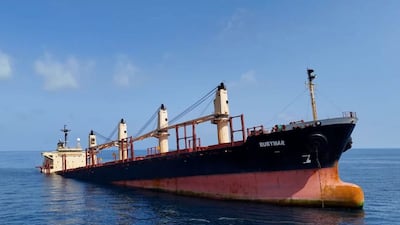Live updates: Follow the latest news on Israel-Gaza
The freighter MV Rubymar, which was targeted in an attack by Houthi rebels on February 18, has sunk in the Red Sea, Yemen's government said on Saturday.
Experts told The National last week that the failure to recover the ship could lead to an environmental disaster as its cargo of more than 20,000 tonnes of fertiliser could damage the region’s fragile ecology.
Yemeni Prime Minister Ahmed Awad Bin Mubarak said the ship's sinking was an “environmental catastrophe that Yemen and the region have never experienced before”.
“It is a new tragedy for our country and our people. Every day, we pay for the Houthi militia’s adventures, which were not stopped at plunging Yemen into the coup disaster and war,” he wrote on X, formerly Twitter.
The Rubymar was heading for Bulgaria when it was struck by Yemen's Houthis, who have been attacking commercial vessels in the Red Sea since November, in a campaign the group says is aimed at disrupting global trade to put pressure on Israel to withdraw from the Gaza Strip.
The ship had been taking on water since it was hit by two Houthi ballistic missiles, one of which pierced its side. Photos released showed the vessel's stern submerged to deck level. Fuel leaking from the ship had created a 30km-long slick.
The Rubymar is the first vessel to be sunk since Iran-aligned Houthi forces began drone and missile attacks in mid-November against international commercial shipping in the Red Sea and the Bab Al Mandeb – a route that accounts for about 12 per cent of the world's shipping traffic.
The militia has vowed to continue their attacks as long as Israel continues to commit “crimes” against Palestinians.
The ship’s cargo of fertiliser could have disastrous ecological consequences in the Red Sea, according to Sammy Kayed, an environmental expert who has worked with the UN.
The area is home to a delicate aquatic ecosystem with coral reefs as far south as the Bab Al Mandeb.
“Essentially, a fertiliser spill would cause a rapid nutrient increase, which means it gives a lot of food or nutrition for algae to bloom rapidly and this will disrupt the balance of marine ecosystems,” Mr Kayed told The National.
“And then you'd have oxygen depletion, where the algae breaks down and consumes a lot of oxygen and leads to very low dissolved oxygen levels, which leads to dead zones where aquatic life can't survive,” he said.
“If the current takes the spill towards the coast where the corals are, the algae brooms would block and deprive coral reefs of sunlight and that would cause serious damage to coral reefs,” he said.
“If there is a lot of ammonium in the water it can also be toxic to marine organisms. It will damage gills, cause respiratory stress or failure, and neurological effects.
“All this puts stress on a very biodiverse part of the world. Southern Red Sea coral reefs are some of the most pristine and undisturbed in the world.”







